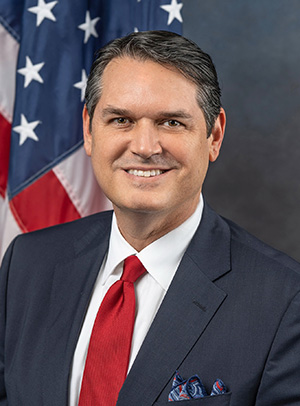
The governor of New York is the head of government of the U.S. state of New York. The governor is the head of the executive branch of New York's state government and the commander-in-chief of the state's military forces. The governor has a duty to enforce state laws and the power to either approve or veto bills passed by the New York Legislature, to convene the legislature and grant pardons, except in cases of impeachment and treason. The governor of New York is the highest paid governor in the country.

The governor of the State of Maryland is the head of government of Maryland, and is the commander-in-chief of the state's National Guard units. The governor is the highest-ranking official in the state and has a broad range of appointive powers in both the state and local governments, as specified by the Maryland Constitution. Because of the extent of these constitutional powers, the governor of Maryland has been ranked as being among the most powerful governors in the United States.
A comptroller is a management-level position responsible for supervising the quality of accounting and financial reporting of an organization. A financial comptroller is a senior-level executive who acts as the head of accounting, and oversees the preparation of financial reports, such as balance sheets and income statements.

The government of Maryland is conducted according to the Maryland Constitution. The United States is a federation; consequently, the government of Maryland, like the other 49 state governments, has exclusive authority over matters that lie entirely within the state's borders, except as limited by the Constitution of the United States.
A permanent secretary is the most senior civil servant of a department or ministry charged with running the department or ministry's day-to-day activities. Permanent secretaries are the non-political civil service chief executives of government departments or ministries, who generally hold their position for a number of years at a ministry as distinct from the changing political secretaries of state to whom they report and provide advice. The role originated in the civil service of the United Kingdom and has been adopted in several Commonwealth countries as well as other countries influenced by the Westminster system.

The comptroller of Maryland is a constitutional officer of the U.S. state of Maryland. Thirty-four individuals have held the office of comptroller since 1851, when the office was created. The incumbent is Brooke Lierman, a Democrat.

The government of Florida is established and operated according to the Constitution of Florida and is composed of three branches of government: the executive branch consisting of the governor of Florida and the other elected and appointed constitutional officers; the legislative branch, the Florida Legislature, consisting of the Senate and House; and the judicial branch consisting of the Supreme Court of Florida and lower courts. The state also allows direct participation of the electorate by initiative, referendum, and ratification.

The Florida Cabinet is a body of the government of Florida comprising the attorney general, the commissioner of agriculture, and the chief financial officer that engages in the collective governance of the state.
The Treasurer/Insurance Commissioner/Fire Marshal is a former statewide constitutional officer of Florida. The office was abolished following the Florida Cabinet reforms of 1998 which took effect in 2003.

The chief financial officer of Florida is an elected statewide constitutional officer of Florida. The office was created in 2002 following the 1998 reforms of the Florida Cabinet. The CFO is a combination of the former offices of comptroller and treasurer/insurance commissioner/fire marshal. The office heads the Florida Department of Financial Services and is responsible for overseeing the state's finances, collecting revenue, paying state bills, auditing state agencies, regulating cemeteries and funerals, and handling fires and arsons. In addition, the CFO has administrative oversight over the offices which handles banking and insurance regulation. The CFO is a member of the Cabinet, and is third in the line of succession to the office of Governor of Florida.

The New York state comptroller is an elected constitutional officer of the U.S. state of New York and head of the New York state government's Department of Audit and Control. Sixty-one individuals have held the office of State Comptroller since statehood. The incumbent is Thomas DiNapoli, a Democrat.
In the state and territorial governments of the United States, 54 of the 56 states and territories have the executive position of treasurer. New York abolished the office of New York State Treasurer in 1926, in which the duties were transferred to the New York State Comptroller. Texas abolished the position of Texas State Treasurer in 1996, transferring the duties of that office to the Texas Comptroller of Public Accounts.

The secretary of state of Florida is an executive officer of the state government of the U.S. state of Florida, established since the original 1838 state constitution. Like the corresponding officials in other states, the original charge of the secretary of state—to be the "Keeper of the Great Seal"—has expanded greatly since the office was first created. According to the state website, "Today, the Secretary of State is Florida's Chief of Elections, Chief Cultural Officer, the State Protocol Officer and the head of the Department of State."

The lieutenant governor of Louisiana is the second highest state office in Louisiana. The current lieutenant governor is Billy Nungesser, a Republican. The lieutenant governor is also the commissioner of the Louisiana Department of Culture, Recreation & Tourism.

The secretary of state of Texas is one of the six members of the executive department of the State of Texas in the United States. Under the Constitution of Texas, the appointment is made by the governor of Texas, with confirmation by the Texas Senate.

The commissioner of agriculture is a constitutional officer in the executive branch of government of the U.S. state of Florida that heads the Florida Department of Agriculture and Consumer Services (FDACS). Elected for a four-year mandate that is limited to two consecutive terms of office, the commissioner of agriculture is charged with supporting and regulating Florida's agriculture industry, conserving soil and water resources, managing state forests, protecting consumers from unfair trade practices, and ensuring the safety and wholesomeness of food in the marketplace. In addition, the commissioner is one of four members of the Florida Cabinet and is fourth in the line of succession to the office of governor. The thirteenth and current commissioner is Republican Wilton Simpson, who took office on January 3, 2023.

The Florida Department of Agriculture and Consumer Services (FDACS) is an executive department of the government of Florida.

A lieutenant governor is an official in state governments of 45 out of 50 of the United States. In most cases, the lieutenant governor is the highest officer of state after the governor, standing in for that officer when they are absent from the state or temporarily incapacitated. In the event a governor dies, resigns or is removed from office, the lieutenant governor typically becomes governor.
In the United States, each state and territory has constitutional officers who lead the state governments of the United States. These officers may be elected or appointed, depending on the position. The number and powers of state constitutional officers varies from state to state, based on the constitution and statutes of each state. State constitutional officers may reside in the executive or legislative branch, while state constitutions also establish the judicial system of the state, including state supreme courts.

Florida Amendment 8 is an amendment to the Florida state constitution that was passed on November 3, 1998. This amendment, which had first been put forth by the Florida Constitutional Revision Commission, amended articles 2, 3, 4, 8, 9, 11, and 13 of Florida's state constitution in an attempt to restructure the cabinet.





















